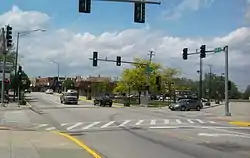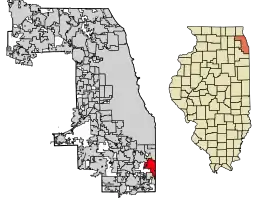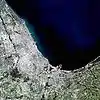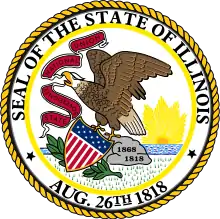Lansing, Illinois
Lansing is a village in Cook County, Illinois, United States. Lansing is a south suburb of Chicago. The population was 28,331 at the 2010 census.[3]
Lansing, Illinois | |
|---|---|
Village | |
| Village of Lansing, Illinois | |
 Ridge Road in downtown Lansing | |
 Flag | |
| Motto(s): "A community of pride, progress, and possibilities" | |
 Location of Lansing in Cook County, Illinois. | |
.svg.png.webp) Location of Illinois in the United States | |
| Coordinates: 41°33′57″N 87°32′45″W | |
| Country | |
| State | Illinois |
| County | Cook |
| Townships | Thornton, Bloom |
| Incorporated | 1893 |
| Government | |
| • Type | Mayor-Trustee |
| • Mayor | Patty Eidam |
| Area | |
| • Total | 7.52 sq mi (19.48 km2) |
| • Land | 7.46 sq mi (19.33 km2) |
| • Water | 0.06 sq mi (0.15 km2) 0.88% |
| Population (2010) | |
| • Total | 28,331 |
| • Estimate (2019)[2] | 27,402 |
| • Density | 3,672.21/sq mi (1,417.86/km2) |
| Up 0.88% from 1990 | |
| Standard of living (2009-11) | |
| • Per capita income | $24,329 |
| • Median home value | $148,500 |
| ZIP code(s) | 60438 |
| Area code(s) | 708 |
| Geocode | 42028 |
| FIPS code | 17-42028 |
| Website | villageoflansing |
| Demographics (2010)[3] | |||
|---|---|---|---|
| White | Black | Asian | |
| 58.9% | 31.6% | 0.9% | |
| Islander | Native | Other | Hispanic (any race) |
| 0.02% | 0.2% | 8.3% | 14.5% |
Geography
Lansing is located at 41°33′57″N 87°32′45″W (41.565785, -87.545791).[4] It is 6.9 miles (11.1 km) south of the Chicago city limits at 138th Street, and 25.6 miles (41.2 km) from the Chicago Loop. Lansing is bordered by Glenwood and Thornton to the west, Calumet City and South Holland to the north, Lynwood to the south, and by Munster and Hammond in Indiana to the east.
According to the 2010 census, Lansing has a total area of 6.848 square miles (17.74 km2), of which 6.79 square miles (17.59 km2) (or 99.15%) is land and 0.058 square miles (0.15 km2) (or 0.85%) is water.[5] Lansing sits on the Calumet Shoreline, an ancient shoreline of Lake Michigan. This shoreline runs along Ridge Road.
Government
The current Mayor of Lansing is Patty Eidam.[6]
Lansing is represented in the United States Congress by Representative Robin Kelly, of Illinois' 2nd congressional district, as well as Senators Dick Durbin and Tammy Duckworth in the United States Senate.
History
The first family to settle in Lansing was that of August Hildebrandt in 1843. Henry, George, and John Lansing settled the area in 1846, which was incorporated in 1893. Early settlement in the village was primarily by Dutch and German immigrants. Industrial development of the surrounding Calumet region attracted immigrants from Ireland and Eastern Europe to the village in the 20th century. These settlement patterns are reflected in Lansing's current demographics; according to the census[7] the top five ancestries that were in Lansing in 2000 were German (17%), Polish (13%), Irish (13%), Dutch (11%), and Italian (7%). However, according to City-data.com 2016 estimates, these ancestries began to change in the mid-90s and early 2000s, when most residents were of African American ancestry (8,871), followed by Latinos (4,183), and Asian (Southeast Asian) (255) .
Demographics
| Historical population | |||
|---|---|---|---|
| Census | Pop. | %± | |
| 1900 | 830 | — | |
| 1910 | 1,060 | 27.7% | |
| 1920 | 1,409 | 32.9% | |
| 1930 | 3,378 | 139.7% | |
| 1940 | 4,462 | 32.1% | |
| 1950 | 8,682 | 94.6% | |
| 1960 | 17,475 | 101.3% | |
| 1970 | 22,916 | 31.1% | |
| 1980 | 28,958 | 26.4% | |
| 1990 | 28,131 | −2.9% | |
| 2000 | 28,332 | 0.7% | |
| 2010 | 28,331 | 0.0% | |
| 2019 (est.) | 27,402 | [2] | −3.3% |
| U.S. Decennial Census[9] | |||
As of the census[7] of 2010, there were 28,331 people, 11,416 households, and 7,774 families residing in the village. The population density was 4,188.7 people per square mile (1,618.2/km2). There were 11,748 housing units at an average density of 1,736.9 per square mile (671.0/km2). The racial makeup of the village was 58.93% White, 31.59% African American, 0.02% Native American, 0.94% Asian, 0.02% Pacific Islander, 6.11% from other races, and 2.18% from two or more races. Hispanic or Latino of any race were 14.48% of the population.
There were 11,416 households, out of which 30.3% had children under the age of 18 living with them, 53.3% were married couples living together, 11.4% had a female householder with no husband present, and 31.9% were non-families. 27.9% of all households were made up of individuals, and 12.6% had someone living alone who was 65 years of age or older. The average household size was 2.48 and the average family size was 3.06.
In the village, the population was spread out, with 24.3% under the age of 18, 7.8% from 18 to 24, 29.1% from 25 to 44, 23.1% from 45 to 64, and 15.6% who were 65 years of age or older. The median age was 38 years. For every 100 females, there were 90.1 males. For every 100 females age 18 and over, there were 87.0 males.
The median income for a household in the village was $47,554, and the median income for a family was $56,901. Males had a median income of $45,186 versus $29,152 for females. The per capita income for the village was $22,547. About 3.5% of families and 5.4% of the population were below the poverty line, including 7.7% of those under age 18 and 3.9% of those age 65 or over.
Education
- College
- Visible Music College Chicago Branch
- Public high schools
- Private high schools
- Public primary and middle schools
- Memorial Junior High School
- Nathan Hale Elementary School
- Heritage Middle School
- Oak Glen Elementary School
- Reavis Elementary School
- Coolidge Elementary School
- Private primary and middle schools
- Saint Ann Elementary School
- Lansing Christian School
- Saint John Lutheran School
- Eagle Academy
Notable people
- Bill W. Balthis (1936–2016), Illinois state representative, mayor of Lansing, and businessman[10]
- Tom Gorzelanny, pitcher for the Milwaukee Brewers, spent part of his childhood in Lansing
- Curtis Granderson, outfielder for the New York Mets, graduated from Thornton Fractional South High School
- Harry Smith, former co-anchor for CBS' The Early Show and the host of A&E's Biography series
- Pierre Thomas, running back for the New Orleans Saints, graduated from Thornton Fractional South High School
- Jack E. Walker, Illinois politician, practiced law in Lansing.[11] Walker was convicted of bribery in federal court involving a bill involving the ready-mix concrete business. He went to prison but was paroled because of his health. Walker died at St. Margaret's Hospital in Hammond, Indiana
References
- "2019 U.S. Gazetteer Files". United States Census Bureau. Retrieved July 14, 2020.
- "Population and Housing Unit Estimates". United States Census Bureau. May 24, 2020. Retrieved May 27, 2020.
- "Profile of General Population and Housing Characteristics: 2010 Demographic Profile Data (DP-1): Lansing village, Illinois". U.S. Census Bureau, American Factfinder. Archived from the original on February 12, 2020. Retrieved March 13, 2013.
- "US Gazetteer files: 2010, 2000, and 1990". United States Census Bureau. 2011-02-12. Retrieved 2011-04-23.
- "G001 - Geographic Identifiers - 2010 Census Summary File 1". United States Census Bureau. Archived from the original on 2020-02-13. Retrieved 2015-08-04.
- "Clerk's Office". The Village of Lansing, IL. Village of Lansing. Retrieved May 8, 2017.
- "U.S. Census website". United States Census Bureau. Retrieved 2008-01-31.
- https://www.thelansingjournal.com/news/2018/02/08/blacks-choosing-lansing/
- "Census of Population and Housing". Census.gov. Retrieved June 4, 2015.
- 'Illinois Blue Book 1995-1996,' Biographical Sketch of Biil W. Balthis, pg. 105
- 'Illinois Blue Book 1973-1974, Biographical Sketch of Jack E. Walker, pg. 74
External links
- Village of Lansing official website
- Lansing Public Library
- Lansing's Neighborhood Network Cable Channel 4
- Lan-Oak Park District, Lansing's park district
- Lansing Area Chamber of Commerce
- Thornton Fractional School District 215
- Sunnybrook School District 171
- Lansing School District 158
- Lansing Municipal Airport

